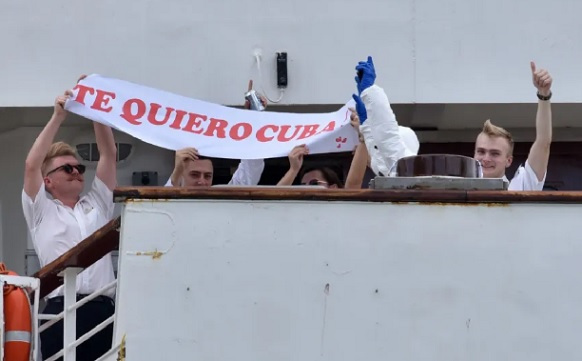Cuba’s Welcome to a Covid-19-Stricken Cruise Ship Reflects a Long Pattern of Global Humanitarian Commitment
The Nation | Saturday, 21 March 2020 | Click here for original article

Crew members of British cruise ship MS Braemar hold a sign reading “I love you Cuba’’ at the harbor in Mariel, Cuba, on March 18, 2020. (Photo by Adalberto Roque/AFP via Getty Images
On March 12, as a British ocean liner approached the Bahamas with almost 50 passengers and crew displaying symptoms of, or diagnosed with, the coronavirus, many on board hoped that their “voyage of the damned” to find a Caribbean nation that would allow them to dock was finally over. The coronavirus-stricken cruise ship, MS Braemar, flew the Bahamian flag; surely the British commonwealth where the ship was registered would be obliged to allow them to disembark for treatment and transportation back to the United Kingdom.
Instead, the Bahamian Ministry of Transport declared that the cruise ship would “not be permitted to dock at any port in The Bahamas and no persons will be permitted to disembark the vessel.” Despite frantic efforts by the British Foreign Ministry and Fred Olsen Cruise Lines, which owns the ship, over the next five days several other Caribbean nations, as well as United States, reportedly denied docking rights.
But on March 18, Cuba became the lone nation to accept the ship. Employing strict guidelines from the World Health Organization, the Cuban authorities assisted more than 1,000 passengers and crew members to exit the boat and board a caravan of buses with a special police escort to José Martí International Airport for chartered flights back to the United Kingdom. To contain the virus required “the efforts of the entire international community,” as Cuba’s foreign minister, Bruno Rodríguez, explained Cuba’s humanitarian response to Britain’s request for help. “Let’s reinforce health care, solidarity and international cooperation.” As the ship docked at the port of Mariel, some 25 miles west of Havana, Cuban citizens reinforced that message by transmitting, via Facebook, best wishes to passengers on board the Braemar. “I am sitting in my cabin responding to every Cuban who has suddenly sent me uplifting, welcoming messages of support. I am quite honestly in floods of tears at their kindness,” one cruiser, Anthea Guthrie, posted on her Facebook page. “They have made us not only feel tolerated, but actually welcome."
Cuba’s medical contributions to the escalating global battle against the pandemic have generated more attention than the containment, so far, of the disease on the island. A drug developed by the Cuban biotech industry, Interferon alfa 2b, which boosts the immune system and has proved effective in previous epidemics such as dengue fever and HIV/AIDS, was among the treatments chosen by Chinese medical authorities to stem the coronavirus outbreak; a number of other nations, including Chile and Spain, have sought access to the drug. Along with supplies of Interferon alfa 2b, a team of Cuban doctors has reportedly been dispatched to Italy to support medical efforts in that Covid-ravaged nation.
Cuba’s international efforts to stem the spread of the virus outside its borders are part of a long and consistent pattern of global humanitarian commitment. For decades, the government has provided full scholarships to thousands of foreign medical students to study at the vaunted Escuela Latinoamericana de Medicina, Cuba’s international medical university. Cuban medical brigades have brought free health care and services to impoverished populations in dozens of Third World nations; since 2004, for example, Cuban ophthalmologists have performed eye surgery—cataract, glaucoma, and retina re-attachment procedures, among other treatments—in some 39 nations as part of a humanitarian aid program known as “Operation Miracle.”
The “doctors’ diplomacy” programs have also been internationally recognized for their rapid response to disasters and epidemics. Cuban medical personnel were the “unsung heroes” in Haiti, according to National Public Radio, after the devastating January 2010 earthquake struck that country, killing at least 100,000 people; some 400 Cuban doctors were among the first responders to establish and staff hospitals for thousands of injured Haitians. Cuban medical personnel also established their credentials for courage during the dangerous fight to stem the Ebola epidemic in Africa. “One of the very first countries to step forward was Cuba, which sent more than 200 health professionals to the region—an awe-inspiring contribution for a country of just 11 million people,” stated then–US ambassador to the United Nations, Samantha Power, in October 2016—one of a number of compliments Obama administration officials paid to the achievements of the Cuban Revolution during the two years Washington was pursuing a policy of reconciliation, dialogue, and normalization of relations with Havana. “Noble efforts like these are precisely why the United States and Cuba must continue to find ways to engage, even as our differences persist,” Ambassador Power noted during her UN speech on the positive potential for US-Cuba collaboration in the international medical field and beyond.
For Cubans, the irony is not lost that they are being punished at a time when they have a valuable contribution to make to the well-being of so many beyond their borders. “The great paradox is that while the ships contracted by Cuba to carry oil and food are harassed by the United States, the ships carrying the sick that nobody wants in their ports receive solidarity and respect in Cuba,” Cuban journalist Rosa Miriam Elizalde wrote recently in the Mexican newspaper La Jornada.
Indeed, for the passengers who were aboard the MS Braemar, Cuba’s solidarity and respect at a time of dire fear and uncertainty has made a demonstrable difference in their lives. “Thank you, Cuba that you could open your hearts to us. We will never ever forget that you reached out to us when absolutely nobody, and I mean nobody, else would,” Anthea Guthrie wrote on Facebook. “I trust we will never ever forget the help we’ve had from a poor country with a brave, huge heart.”






